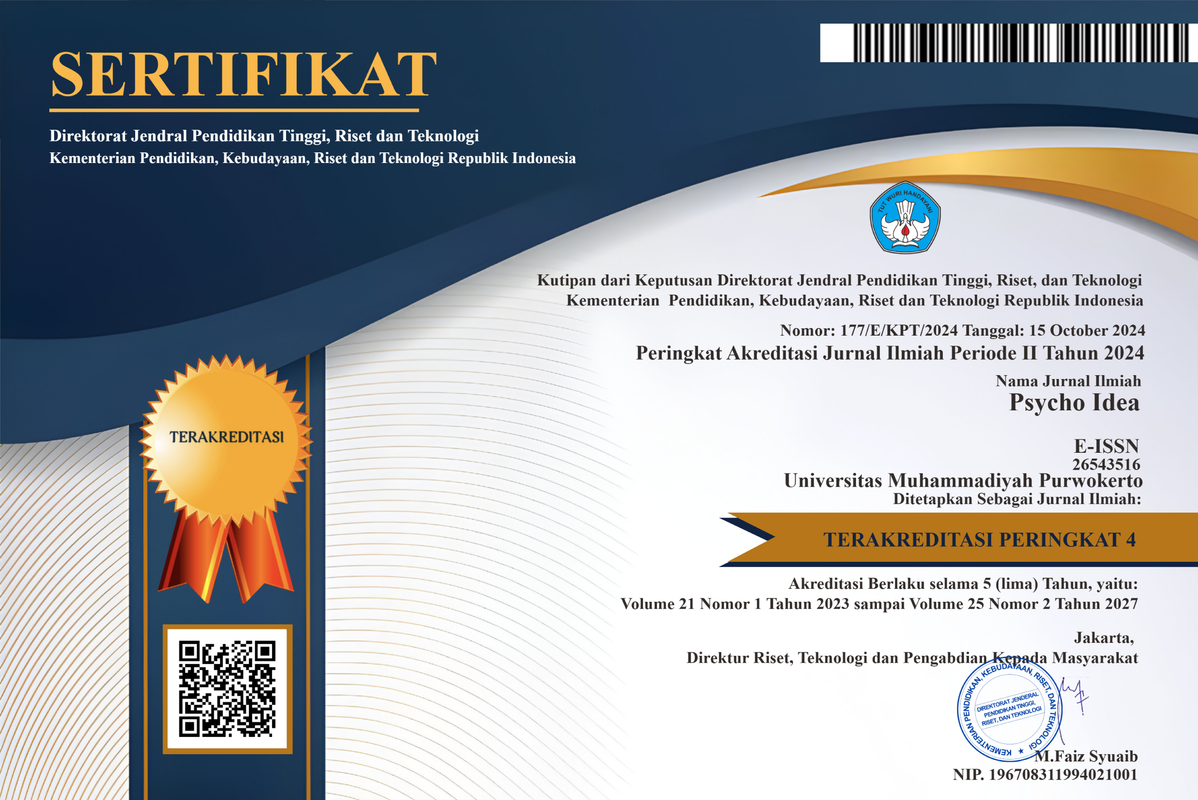HUBUNGAN ANTARA HARDINESS (KEPRIBADIAN TAHAN BANTING) DENGAN INTENSI TURNOVER PADA KARYAWAN PT SUMBER ALFARIA TRIJAYA Tbk DI WILAYAH GOMBONG KABUPATEN KEBUMEN
DOI:
https://doi.org/10.30595/psychoidea.v11i2.509Abstract
Penelitian ini bertujuan untuk menguji hubungan antara hardiness dengan intensi turnover pada karyawan PT Sumber Alfaria Trijaya Tbk wilayah Gombong. Hipotesis yang diajukan dalam penelitian ini adalah ada hubungan negatif hardiness dengan intensi turnover pada karyawan. Penelitian ini menggunakan metode kuantitatif dengan populasi penelitian adalah seluruh karyawan PT Sumber Alfaria Trijaya Tbk di wilayah Gombong. Teknik analisis data dengan menggunakan analisis korelasi product moment. Berdasarkan hasil analisis data diperoleh angka korelasi r = -0,742 pada taraf signifikansi 5% dengan nilai p = 0,000 (0,000 <0,05), artinya terdapat hubungan negatif yang signifikan antara hardiness dengan intensi turnover pada karyawan. Sumbangan efektif yang diberikan variabel hardiness terhadap variabel intensi turnover sebesar 55%. Kata Kunci : Hardiness, Intensi TurnoverReferences
Ajzen. L & Fishbein. M. (1975). Belief, Attitude, Intention and Behaviour: An Introduction to theory and Research. Philippines: Addison-Wesley Publishing.
Andiani, Ria. (2008). Hubungan Kepribadian Tahan Banting ( Hardiness) dengan Stres Kerja Pada Karyawan. Skripsi. Jogjakarta : Fakultas Psikologi dan Ilmu Sosial Budaya Universitas Islam Indonesia.
Anonim.. (2011).http://www.investor.co.id. Diakses 5 Oktober 2011.
Anonim. (2011).http://www.alfamartku.com. Diakses 7 Oktober 2011.
Anwar, K., & Harmaini. (2005). Hubungan antara Komitmen Beragama dengan Intensi Prososial Mahasiswa Fakultas Psikologi UIN SUSKA Riau. Jurnal Psikologi, Vol 1, No. 2, 69-77
Cascio, E.S. (1987). Creative Human Resources Planning and Applications: A Strategic Approach. New Jersey: Prentice-Hall Inc.
Chaplin, J.P., (2004). Kamus Lengkap Psikologi. Alih Bahasa : Kartini Kartono, Jakarta : P.T. Raja Grafindo Persada
Fishbein dan Ajzen, (1975). Belief, Attitude, Intentions and Behavior: an introduction to theory and research. California: Addison-Wesley Publishing Company, Inc
Harnoto. (2002). Manajemen Sumber Daya Manusia. Edisi Kedua. Jakarta : PT. Presalindo.
Hasibuan, M.SP., (2000). Manajemen Sumber Daya Manusia. Jakarta : Bumi Aksara.
Heriyanto, Y. (2011). Hardiness Pada Penderita Jantung Koroner ( Studi Deskriptif Kuantitatif di Purwokerto). Skripsi. Purwokerto: Fakultas Psikologi Universitas Muhammadiyah Purwokerto.
Istono, M. (1999). Hubungan Antara Tipe Kepribadian Hardiness dengan Kecenderungan Menggunakan Problem Focused Coping pada Waraniaga. Skripsi (tidak diterbitkan). Yogjakarta: Fakultas Psikologi UGM.
Kobasa, S. C. Maddi S. R., & Kahn, S. (1982). Hardiness and Health: a Prospective Study. Journal of Personality and Social Psychology, 42, 168-177
.
Maier, Norman P.F.,(1971).Psichology in Industry 3rd Edition. New Delhi : Oxford and Ibn Publising.
Mobley,W.H., (1986). Pergantian Karyawan: Sebab, Akibat dan Pengendaliannya. Terjemahan. Jakarta : PT Pustaka Binaman.
Riggio, R.E. (1990). Introduction to Industrial Organizational Psychology. London:Scatt Foresman and Company.
Smet, B. (1994). Psikologi Kesehatan. Jakarta : PTGramedia Widiasarana.
Utami, C. W. (2008) .Manajemen Ritel : Strategi dan Implementasi Ritel Modern. Jakarta : Salemba Empat.
Widodo, J. (2007). Analisa Kebijakan Publik. Malang : Bayu Media Publishing
Wijono, S. (2010). Psikologi Industri dan Organisasi dalam Suatu Gerak Psikologi Sumber Daya Manusia. Jakarta : Kencana Prenada Media Group.
Downloads
Published
Issue
Section
License
Authors published in this journal agree to the following terms:
- The copyright of each article is retained by the author (s) without restrictions
- The journal allows the author(s) to retain publishing rights without restrictions
- The author grants the journal the first publication rights with the work simultaneously licensed under the Creative Commons Attribution License, allowing others to share the work with an acknowledgment of authorship and the initial publication in this journal.
- Authors may enter into separate additional contractual agreements for the non-exclusive distribution of published journal versions of the work (for example, posting them to institutional repositories or publishing them in a book), with acknowledgment of their initial publication in this journal
- Authors are permitted and encouraged to post their work online (For example in the Institutional Repository or on their website) before and during the submission process, as this can lead to productive exchanges, as well as earlier and larger citations of published work
- Articles and all related material published are distributed under a Creative Commons Attribution-4.0 International Public License (CC - BY 4.0).
License
Psycho Idea is licensed under a Creative Commons Attribution- 4.0 International Public License (CC - BY 4.0).
You are free to :
Share — copy and redistribute the material in any medium or format
Adapt — remix, transform, and build upon the material for any purpose, even commercially











